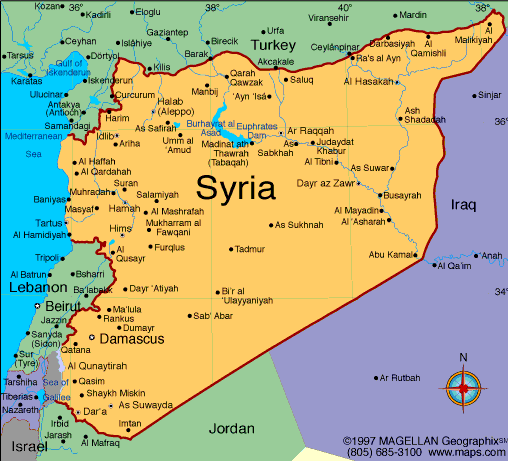Chemical warfare in Syria
April 9, 2018 | Expert Insights

At least 42 people in Douma, Syria have died due to an alleged chemical attack. The US government has blamed the official Syrian government of orchestrating this attack against its civilians.
Background
Over the span of several centuries, Syria, which was at the forefront of the Islamic Caliphate, witnessed multiple invasions and occupations. The Romans, the Crusaders and the Turks have tried to gain control of the region.
The Syrian Civil War has been going on since 2011. It began during the Arab Spring protests, due to resentment towards the government of President Bashar al-Assad. The war is being fought by several factions: the Syrian government and its allies, a loose alliance of Sunni Arab rebel groups (including the Free Syrian Army), the majority-Kurdish Syrian Democratic Forces (SDF), Salafi jihadist groups (including al-Nusra Front) and the Islamic State of Iraq and the Levant (ISIL), with a number of countries in the region and beyond being either directly involved, or rendering support to one faction or another.
The Syrian government has often been accused of conducting chemical warfare against its own citizens in rebel regions. In April 2017, news emerged of an alleged chemical attack on a rebel-held Syrian town. At least 74 people, including 11 children, were killed in Khan Sheikhoun, Idlib province. The attack was the deadliest use of chemical weapons in the Syrian civil war since the Ghouta chemical attack in 2013.
The international community including the governments of United States, United Kingdom, Turkey, Saudi Arabia, France, and Israel, as well as Human Rights Watch have attributed the attack to the forces of Syrian President Bashar al-Assad. This is a charge that the Syrian government has vehemently denied. The attack resulted in the complete dissolution of a working relationship between the US and Syrian government. US Secretary of State Rex Tillerson signaled a sudden shift in policy by the Trump administration, saying that Bashar al-Assad should have no role in a future Syria.
The United States also fired 59 Tomahawk cruise missiles on the Shayrat Air Base in response to the chemical attack.

Analysis
The multiple conflicts within Syria have resulted in the region suffering from a full fledged humanitarian crisis. On 7th April 2018, news emerged that another large scale chemical attack had taken place in Syria. This occurred in the city of Douma and resulted in the deaths of at least 42 people. Opposition forces and medics on the ground claimed the chemical agents to be chlorine gas and sarin and attributed the actions to the Assad government. 300 people have been affected overall.
Douma is held by rebels. In early 2018, the main rebel faction in the area was Jaysh al-Islam. The attack came during a period when negotiations for the forced exile of tens of thousands of civilians and fighters from the area faltered.
“The attack was near bomb shelters and so it spread quickly in them,” said a paramedic who helped treat the latest group of victims. “The gas was concentrated and in a place where people thought they were safe. The wounded arrived to us with expanded irises and loss of motor control; many were suffocating because of the high concentration of the gas ... A lot of cases arrived too late. We sent some rescue workers to save people and four of them came back because they also suffocated, and we treated them as victims. The situation is very bad.”
The US government led other nations in strongly condemning the Syrian government. US President Donald Trump in a rare occurrence, criticized not only Assad but also Russian President Vladimir Putin. Russia has been a staunch ally of the official Syrian government. In addition, Russia has also been accused of preventing investigations into chemical attacks in the region at the UN.
"Many dead, including women and children, in mindless CHEMICAL attack in Syria," Trump tweeted. "Area of atrocity is in lockdown and encircled by Syrian Army, making it completely inaccessible to outside world. President Putin, Russia and Iran are responsible for backing Animal Assad. Big price..."
He continued, "....to pay. Open area immediately for medical help and verification. Another humanitarian disaster for no reason whatsoever. SICK!"
Counterpoint: The Syrian media has denied that the official government played a role in the chemical attack. It has noted that it was the rebels who are currently spreading these rumors and this is nothing more than “fake news.”
The Chemical Weapons Convention
The Chemical Weapons Convention (CWC) is a multilateral treaty that bans chemical weapons and requires their destruction within a specified period of time. The treaty is of unlimited duration and is far more comprehensive than the 1925 Geneva Protocol, which outlaws the use, but not the possession, of chemical weapons.
Assessment
Our assessment is that this development threatens to broaden the scale of conflict taking place within Syria. It is already one of the most embattled regions in the world. Chemical weapons such as Sarin are extraordinarily painful to the victims. These weapons result in victims experiencing burning eyes and foaming from their mouths. Even a small dose of Sarin can be extremely lethal and painful. Due to the fact it is so potent, it is also considered a weapon of mass destruction. Among those who are victims of the present attack are children. The international community must come together to ensure the perpetrators of such inhumane acts are held responsible for these actions.
Read more:








Comments